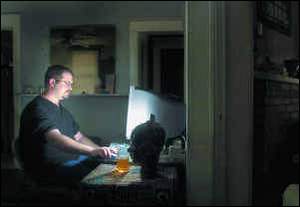Michelle's latest crusade
I like Michelle Malkin. I read her every day. Every so often though, she gets a hold of a benign issue, bites down and wastes enormous energy shaking it to death.
Butchery? There's ample evidence that the New York Times is anti-war but butchery is not the word for this non-issue.
The question is whether reporter James Dao should have excerpted a longer segment of Corporal Starr's final letter, refrained from excerpting it at all, or whether the bit he did excerpt is damning evidence of an anti-troop bias.
Here's what was printed in the Times:
According to Jeffrey Starr's uncle, here is the unedited final letter:
I respect the opinions of those who disagree with me, but I just don't see any cause for outrage here. Dao's behavior since publication is worthy of scorn (read the exchange between James Dao and Michael Valois at the Malkin link) but the original abrieviated quote passes muster with me. Here's why:
I'm alive after seven months in Iraq (most of that time was with the outstanding Marines of the 1/5, by the way) but I was prepared to die for a cause I believe in. In fact, I was so concerned that I got into a heated exchange with my Team Leader over driver rotation. I asked him aside and said, "If I have to take a bullet defending my country, that's one thing. I signed up knowing that was a posability. But death by sleepy driver? A senseless HUM VEE crash is not a risk I signed up for." To his credit, from that point on, shift rotation and driver duty was never an issue. He was a natural leader.
Every Marine in combat contemplates what I call the "casual nature of wartime unluckiness." When civillians imagine themselves in the same circumstances, the resulting conclusions are often shockingly inaccurate.
Should Dao have included a longer excerpt of Corporal Starr's last letter? Yes. That would have headed off this entire controversy. But by qualifying just before the offending, abrieviated quote that CPL Starr supports the war, Dao has headed off accusations of unfair reportage. It's a simple statement, "Corporal Starr believed strongly in the war, his father said, but was tired of the harsh life and nearness of death in Iraq." It's the kind of statement that a Marine would make. It's what I said after my enlistment ended and I chose not to reenlist. I believe strongly in the war, but I was tired of the harsh life.
I just don't see anything wrong with that. I've read the entire 4,000+ word article and Michelle's reason for objection just eludes me.
UPDATE: Many, many, many respectable people around the world disagree with me, saying their condemnation of the Times is justified. And after careful consideration I've decided that they're right, and I was wrong. My initial reaction was out of a personal desire to avoid even the appearance of using Starr's memory in a political scrap with the stupid Times. Jeffery Starr was one the Marines literally safeguarding my life in 2003 and I want to honor him, not use him. But likewise, I don't want it to appear as if I'm heaping scorn on those who rally to his defense. They certainly do so without cynicism. I apologize.
Starr's uncle: "Although what is ironic, by them leaving out the most important part of Jeffrey’s letter, it’s gotten more publicity, so in one sense, the whole episode really does honor Jeffrey, because this story has gotten a lot more publicity than it would have had “The Times” actually run the whole letter."
Quite ironic, and serving of a greater good. In any case, read this far superior story on Jeffrey Starr. A Marine's Last Words
[Malkin]My column in the New York Post today and elsewhere follows up on last week's blog post about the Times' butchery.
Butchery? There's ample evidence that the New York Times is anti-war but butchery is not the word for this non-issue.
The question is whether reporter James Dao should have excerpted a longer segment of Corporal Starr's final letter, refrained from excerpting it at all, or whether the bit he did excerpt is damning evidence of an anti-troop bias.
Here's what was printed in the Times:
Another member of the 1/5, Cpl. Jeffrey B. Starr, rejected a $24,000 bonus to re-enlist. Corporal Starr believed strongly in the war, his father said, but was tired of the harsh life and nearness of death in Iraq. So he enrolled at Everett Community College near his parents' home in Snohomish, Wash., planning to study psychology after his enlistment ended in August.
But he died in a firefight in Ramadi on April 30 during his third tour in Iraq. He was 22.
Sifting through Corporal Starr's laptop computer after his death, his father found a letter to be delivered to the marine's girlfriend. ''I kind of predicted this,'' Corporal Starr wrote of his own death. ''A third time just seemed like I'm pushing my chances.''
According to Jeffrey Starr's uncle, here is the unedited final letter:
Several months after Jeffrey was killed his laptop computer was returned to his parents who found a letter in it that was addressed to his girlfriend and was intended to be found only if he did not return alive. It is a most poignant letter and filled with personal feelings he had for his girlfriend. But of importance to the rest of us was his expression of how he felt about putting his life at risk for this cause. He said it with grace and maturity.
He wrote: "Obviously if you are reading this then I have died in Iraq. I kind of predicted this, that is why I'm writing this in November. A third time just seemed like I'm pushing my chances. I don't regret going, everybody dies but few get to do it for something as important as freedom. It may seem confusing why we are in Iraq, it's not to me. I'm here helping these people, so that they can live the way we live. Not have to worry about tyrants or vicious dictators. To do what they want with their lives. To me that is why I died. Others have died for my freedom, now this is my mark."
I respect the opinions of those who disagree with me, but I just don't see any cause for outrage here. Dao's behavior since publication is worthy of scorn (read the exchange between James Dao and Michael Valois at the Malkin link) but the original abrieviated quote passes muster with me. Here's why:
I'm alive after seven months in Iraq (most of that time was with the outstanding Marines of the 1/5, by the way) but I was prepared to die for a cause I believe in. In fact, I was so concerned that I got into a heated exchange with my Team Leader over driver rotation. I asked him aside and said, "If I have to take a bullet defending my country, that's one thing. I signed up knowing that was a posability. But death by sleepy driver? A senseless HUM VEE crash is not a risk I signed up for." To his credit, from that point on, shift rotation and driver duty was never an issue. He was a natural leader.
Every Marine in combat contemplates what I call the "casual nature of wartime unluckiness." When civillians imagine themselves in the same circumstances, the resulting conclusions are often shockingly inaccurate.
Should Dao have included a longer excerpt of Corporal Starr's last letter? Yes. That would have headed off this entire controversy. But by qualifying just before the offending, abrieviated quote that CPL Starr supports the war, Dao has headed off accusations of unfair reportage. It's a simple statement, "Corporal Starr believed strongly in the war, his father said, but was tired of the harsh life and nearness of death in Iraq." It's the kind of statement that a Marine would make. It's what I said after my enlistment ended and I chose not to reenlist. I believe strongly in the war, but I was tired of the harsh life.
I just don't see anything wrong with that. I've read the entire 4,000+ word article and Michelle's reason for objection just eludes me.
UPDATE: Many, many, many respectable people around the world disagree with me, saying their condemnation of the Times is justified. And after careful consideration I've decided that they're right, and I was wrong. My initial reaction was out of a personal desire to avoid even the appearance of using Starr's memory in a political scrap with the stupid Times. Jeffery Starr was one the Marines literally safeguarding my life in 2003 and I want to honor him, not use him. But likewise, I don't want it to appear as if I'm heaping scorn on those who rally to his defense. They certainly do so without cynicism. I apologize.
Starr's uncle: "Although what is ironic, by them leaving out the most important part of Jeffrey’s letter, it’s gotten more publicity, so in one sense, the whole episode really does honor Jeffrey, because this story has gotten a lot more publicity than it would have had “The Times” actually run the whole letter."
Quite ironic, and serving of a greater good. In any case, read this far superior story on Jeffrey Starr. A Marine's Last Words

